Key takeaways:
- The music industry is evolving due to technology and changing consumer tastes, impacting how artists are compensated and music is consumed.
- Electronic music labels play a crucial role in artist development, providing financial support and fostering community, while also adapting to technological advancements.
- Future trends in electronic music labels may include greater use of digital platforms and blockchain technology for fairer revenue sharing and more niche genre exploration.
- Collaboration and networking are vital for the success of electronic music labels, influencing artist growth and community building within the genre.

Overview of the music industry
The music industry is a vast and ever-evolving landscape, shaped by technological advancements and shifting consumer tastes. I remember the first time I experienced a live electronic music event; the energy in the air was palpable, highlighting how the collective experience drives the passion in this genre. It’s fascinating how platforms like streaming services have transformed how we discover and consume music, making vast libraries accessible at our fingertips.
As I delve into different genres, I often find myself reflecting on the emotional journey each piece takes us on. Have you ever noticed how a particular song can bring back vivid memories and feelings from a specific moment in your life? This power of music drives artists and labels alike, pushing them to create authentic experiences that resonate deeply with listeners.
Financial dynamics also play a crucial role in the industry’s function. The way artists are compensated has changed dramatically, especially with the rise of digital platforms. It makes me wonder—are we truly valuing art and creativity, or are we losing something in this digital shift? Each time I think about this, I’m reminded of the importance of supporting artists directly, ensuring that the music that moves us continues to thrive.
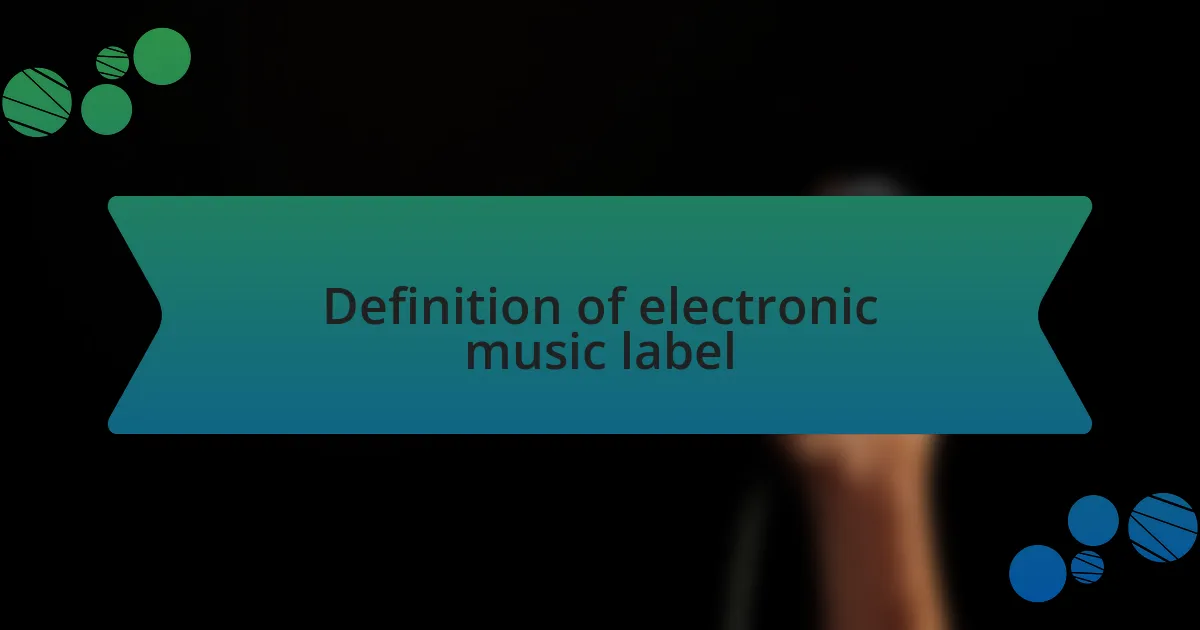
Definition of electronic music label
An electronic music label is essentially a company that specializes in the production, distribution, and promotion of electronic music. I remember the first time I stumbled upon a small indie label that introduced me to underground artists. Their ability to curate unique sounds and innovate beyond mainstream trends left a lasting impression on me. These labels often play a key role in shaping the careers of artists, providing a platform for their creativity to flourish.
At its core, an electronic music label not only focuses on releasing tracks but also fosters community and collaboration within the genre. I find it fascinating how some labels host events that bring together artists and fans, creating a sense of belonging. Have you ever experienced that strong connection at a label showcase? It’s these moments that show how labels can amplify an artist’s voice while nurturing a vibrant culture around electronic music.
In addition, electronic music labels are often at the forefront of trends and technological advancements within the industry. I vividly recall reading how a label embraced virtual reality to enhance their music launches—bringing a whole new dimension to the listening experience. As technology continues to evolve, I can’t help but wonder how future labels will adapt to keep that excitement alive in the rapidly changing music landscape.
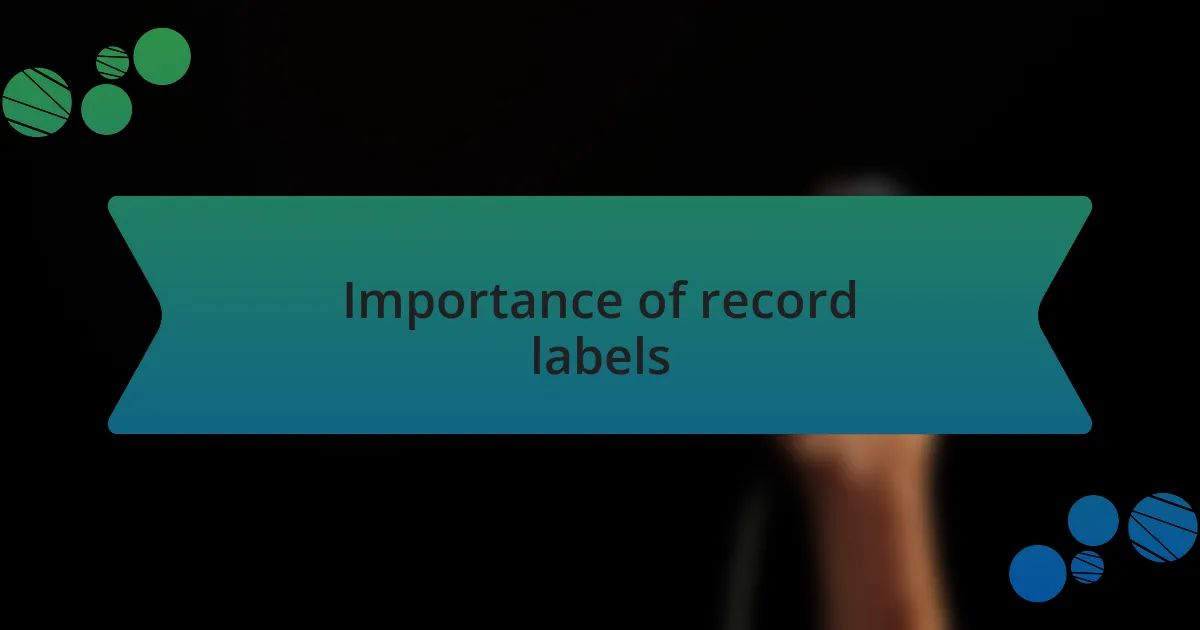
Importance of record labels
When I think about record labels, I realize that they serve as a vital bridge between artists and audiences. They possess the experience and knowledge to navigate the complexities of music distribution and marketing. I once witnessed a friend’s debut album struggle for visibility until it was picked up by a label that believed in his talent. Suddenly, his music reached listeners he never would have connected with on his own, highlighting how crucial these labels are in amplifying voices.
Moreover, record labels often provide much-needed financial support for artists during their early careers. I remember an up-and-coming DJ sharing how he was able to produce his first EP only because the label funded the studio time and production expenses. Without that backing, many talented artists might never have the chance to shine. Isn’t it incredible how a single investment can change the trajectory of someone’s artistic journey?
Additionally, record labels play a significant role in artist development. It’s fascinating to see how they not only release music but also offer guidance on branding and career strategy. I’ve seen artists transform their sound and image through dedicated mentorship. How important do you think that guidance is in a world filled with distractions? It can truly make a difference in shaping an artist’s long-term success and sustainable presence in the music industry.
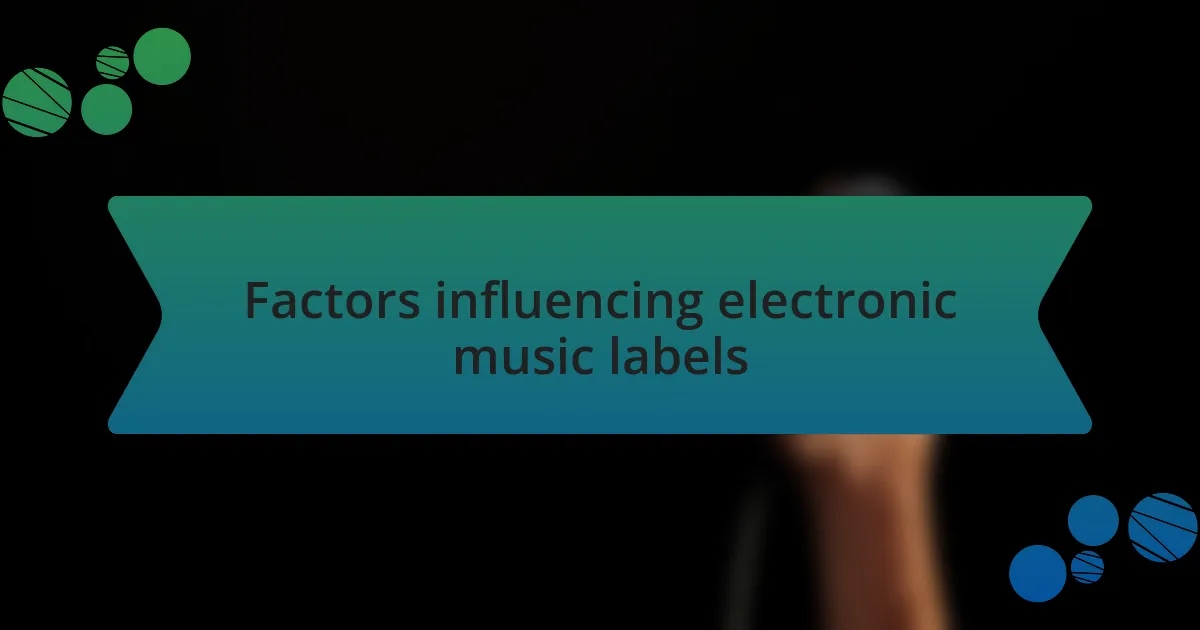
Factors influencing electronic music labels
When considering the factors that influence electronic music labels, one of the most critical is the evolving landscape of technology. I remember feeling astonished as I observed how digital platforms like SoundCloud and Spotify reshaped music consumption. These platforms not only democratize access for emerging artists but also force labels to adapt their strategies, as traditional methods of promotion and distribution become less effective. How often do we overlook the impact of technology on our listening habits?
Another significant factor is the demand for niche genres within the electronic scene. I’ve often found myself vibing to sub-genres that I never knew existed, thanks to labels specializing in those sounds. This specialization not only fosters a stronger fanbase but also encourages artists to experiment and innovate within their craft. Have you ever stumbled upon a track that completely changed your perception of electronic music? It’s thrilling to see labels support such creativity.
Lastly, collaboration and networking play pivotal roles in shaping the success of electronic music labels. I recall attending a local festival where sizable connections were made between artists, promoters, and labels. These interactions can lay the groundwork for future partnerships and help newer labels carve out their niche in a competitive industry. Isn’t it fascinating how a simple conversation can lead to groundbreaking collaborations that elevate the entire scene?
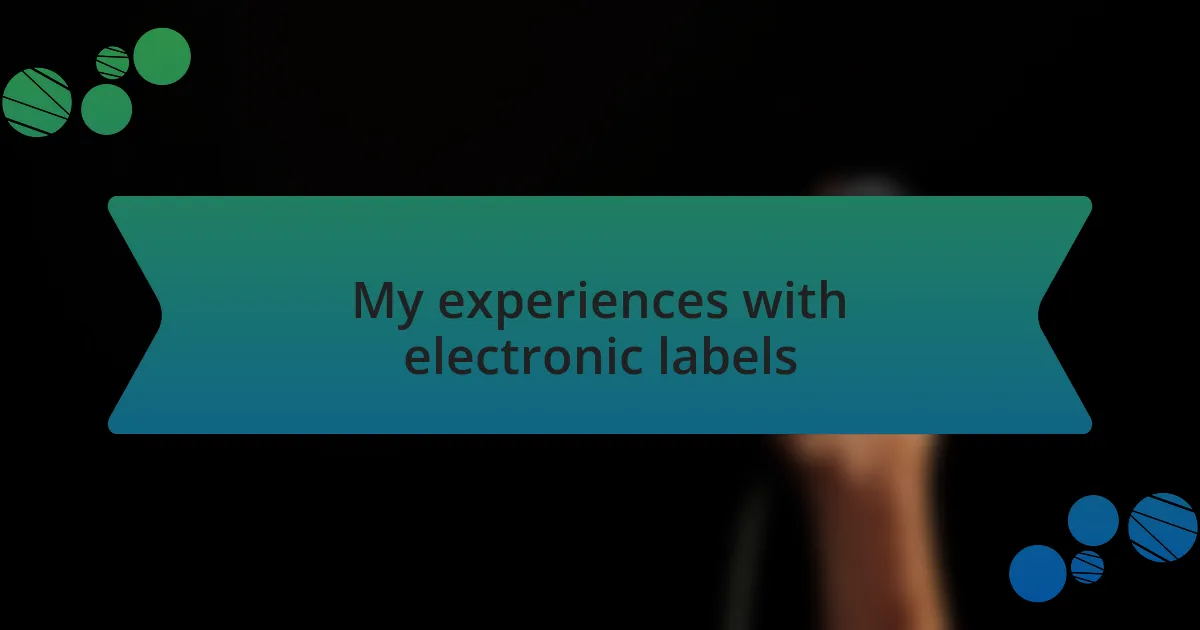
My experiences with electronic labels
Working with electronic labels has been a transformative experience for me. I vividly remember the first time I signed a track with a label that recognized my underground sound. It was exhilarating to see my music featured on their curated playlists, and that moment solidified my belief in the power of collaboration. Have you ever felt that rush when your work resonates with others?
Being part of an electronic label also offered invaluable opportunities for growth. I once attended a label showcase that changed everything for me. The energy in that room was electric, and connecting with like-minded artists and passionate fans was inspiring. It was a reminder that being part of a community can elevate not just your music, but your entire journey in the industry. Who knew a single event could reignite my creative spark like that?
Interestingly, my interactions with electronic labels have taught me the importance of adaptability. In one instance, I had to rework a track based on feedback from label heads, which was initially disheartening. But looking back, it pushed me into uncharted creative territories and significantly improved the final product. Has a learning experience ever transformed your approach to your craft? It’s moments like these that underline the essential balance between personal vision and collaborative input in the music world.
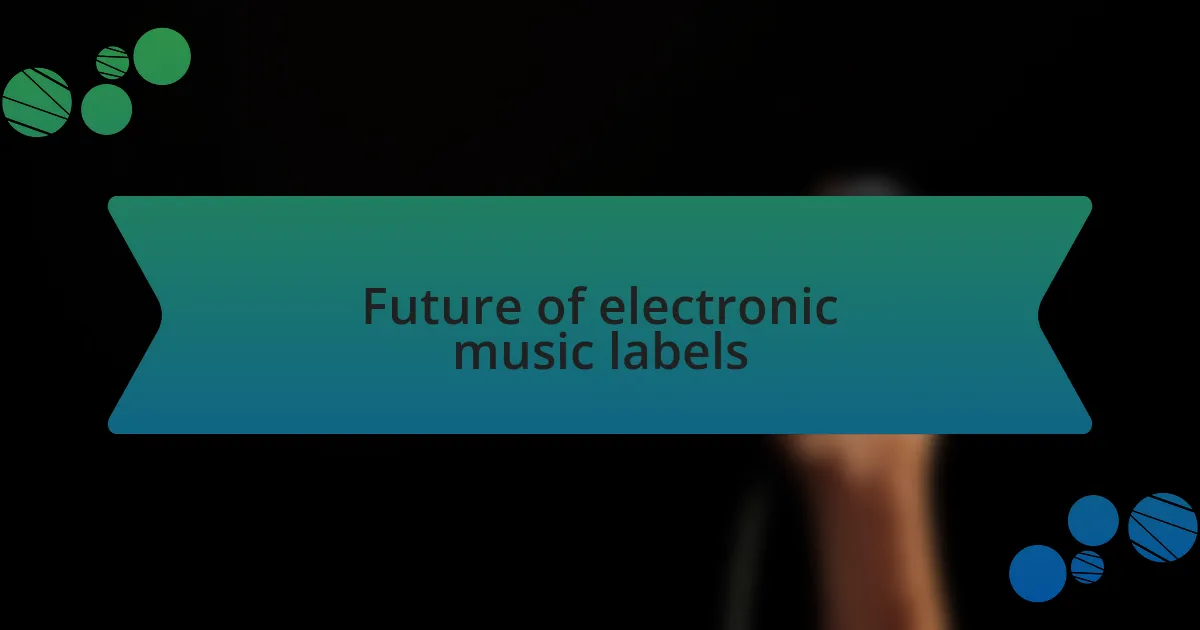
Future of electronic music labels
The future of electronic music labels seems poised for a significant evolution. As technology advances, I believe we’ll see a greater emphasis on digital platforms, allowing artists to connect directly with their audience. This shift could redefine how labels operate—imagine being able to release music and engage with fans without the constraints of traditional models.
One trend I’m particularly excited about is the rise of blockchain technology in the music industry. I remember discussing the potential of decentralized platforms with fellow producers at a recent conference. It’s an intriguing concept that could ensure fairer revenue splits and transparent tracking of music ownership. Could this be the key to empowering independent artists?
I also sense a deeper exploration of niche genres within electronic music labels. During my interactions with up-and-coming artists, it became clear that audiences are eager for authenticity and originality. As I watch smaller labels cultivating unique sounds rather than chasing mainstream success, I can’t help but wonder: will this truly reshape the landscape of electronic music? It feels like a thrilling time to be part of this industry, where innovation and creativity can flourish side by side.